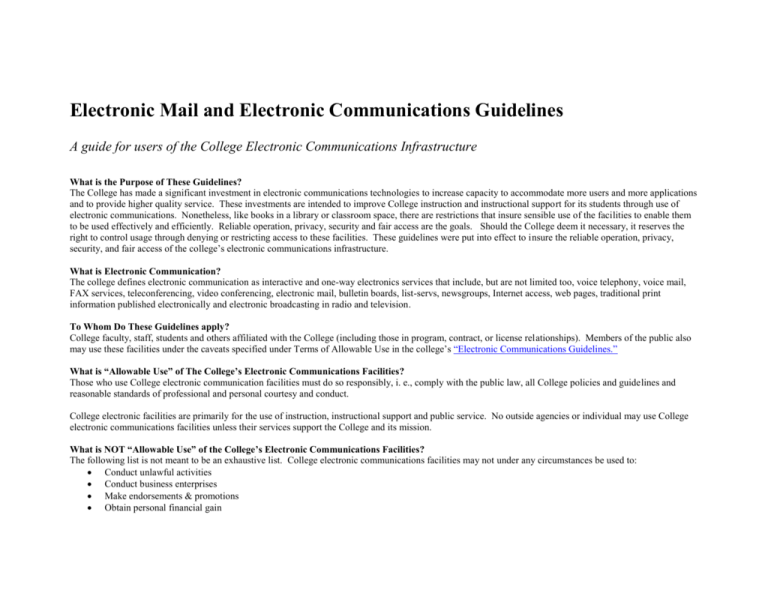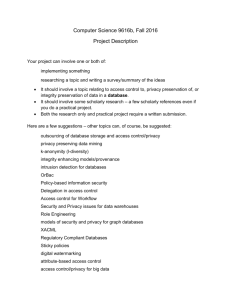What is GLB - College of DuPage
advertisement

Electronic Mail and Electronic Communications Guidelines A guide for users of the College Electronic Communications Infrastructure What is the Purpose of These Guidelines? The College has made a significant investment in electronic communications technologies to increase capacity to accommodate more users and more applications and to provide higher quality service. These investments are intended to improve College instruction and instructional support for its students through use of electronic communications. Nonetheless, like books in a library or classroom space, there are restrictions that insure sensible use of the facilities to enable them to be used effectively and efficiently. Reliable operation, privacy, security and fair access are the goals. Should the College deem it necessary, it reserves the right to control usage through denying or restricting access to these facilities. These guidelines were put into effect to insure the reliable operation, privacy, security, and fair access of the college’s electronic communications infrastructure. What is Electronic Communication? The college defines electronic communication as interactive and one-way electronics services that include, but are not limited too, voice telephony, voice mail, FAX services, teleconferencing, video conferencing, electronic mail, bulletin boards, list-servs, newsgroups, Internet access, web pages, traditional print information published electronically and electronic broadcasting in radio and television. To Whom Do These Guidelines apply? College faculty, staff, students and others affiliated with the College (including those in program, contract, or license relationships). Members of the public also may use these facilities under the caveats specified under Terms of Allowable Use in the college’s “Electronic Communications Guidelines.” What is “Allowable Use” of The College’s Electronic Communications Facilities? Those who use College electronic communication facilities must do so responsibly, i. e., comply with the public law, all College policies and guidelines and reasonable standards of professional and personal courtesy and conduct. College electronic facilities are primarily for the use of instruction, instructional support and public service. No outside agencies or individual may use College electronic communications facilities unless their services support the College and its mission. What is NOT “Allowable Use” of the College’s Electronic Communications Facilities? The following list is not meant to be an exhaustive list. College electronic communications facilities may not under any circumstances be used to: Conduct unlawful activities Conduct business enterprises Make endorsements & promotions Obtain personal financial gain Overload any technology capacities Violate of any other college policy Do anything that is inconsistent with “Allowable Use” Do anything with a false identity Interfere with the College electronic communications infrastructure Incur costs to the college Compromise the college mission Clash with an employee’s job duties Send disruptive, destructive, or unproductive email Misrepresent the college To help facilitate the dissemination of information to all college employees, an e-mail distribution list titled “Official Communications” has been created. Electronic communication that supports College business and impacts all college staff will be sent through this e-mail distribution list. This e-mail distribution list may only be used by the College President, Vice-Presidents, and other authorized college staff. Any college staff seeking to become authorized to use this email distribution list must be given permission by their Vice-President. What is My Expectation for Privacy? Free and open communications are the hallmark of good education and the College maintains a strong commitment to academic freedom, shared governance, freedom of speech and the privacy of information with which it is entrusted. These commitments can be more complex to maintain in the world of electronic communications. Nonetheless, the College does encourage electronic communications and does not routinely inspect, monitor or disclose electronic communications without the holder’s consent. However, because the College may deny access to electronic communication services for, but not limited to, improper use, capacity, and technology, it may inspect, monitor, or disclose electronic communications under appropriate circumstances. College policies on maintaining the privacy of its printed and electronic records also apply to all kinds of electronic communications. However, the College cannot take responsibility for all the challenges modern electronic technologies pose to privacy. Similarly, it cannot assume responsibility for the negligence or inattention to issues of privacy that are the responsibility of users of the electronics communications systems (see “User’s Privacy Responsibility” below). What is the User’s Privacy Responsibility? The College is committed to doing its best to maintain the security of its electronic communications within the bounds of the law, technical feasibility and cost. Users of these facilities bear a significant part of the responsibility for this security. Users should make careful judgments about just how secure a given mode of electronic communication is. Essentially, the more mature the means of communication, e. g. the United States Postal Service or voice telephones, the more privacy one might expect, both through technology and the body of law that has grown up around these older technologies. Newer forms of communication may be technologically less secure and may lack the buttressing laws to protect the user. What is the Penalty for Violating the Electronic Communications Guidelines? Both public law and College policies prohibit the theft or abuse of all its computers, other electronic software and support systems (including computers that support electronic communications facilities, systems, and services). Abuses include (but are not limited to) unauthorized entry, use, transfer, tampering with the communications and/or work of others and with other electronic communications facilities, systems, and services. Certain types of abuses constitute criminal behavior. All employees are encouraged to familiarize themselves with these laws and their relation to College policies and guidelines. In addition to legal sanctions, violators of these guidelines may be subject to disciplinary action including dismissal or expulsion, as relevant, consistent with other College policies, procedures or collective bargaining agreements. For more information refer to the “Electronic Communications Guidelines” and/or contact Keith Conlee, Chief Security Officer for Information Technology, SRC 2001B, (630)-942-3055. College of DuPage 425 Fawell Blvd. Glen Ellyn, IL 60137-6599






